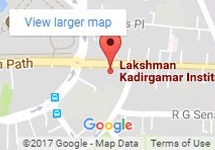
Reading Time: 3 min read
The Lakshman Kadirgamar Institute of International Relations and Strategic Studies (LKI) recently hosted a lecture by Dr. Radhika Coomaraswamy, on ‘Myanmar: The Rohingya Refugee Crisis, Roots of the Conflict and Possibilities for the Future.’ The lecture, which took place on 3 May 2018, began with a comprehensive introduction to Myanmar’s history, including its modern history and the lives of General Aung San— the nationalist leader who was instrumental in securing Burmese independence—and Aung San Suu Kyi, his daughter and Nobel Laureate.
Dr. Coomaraswamy analysed the role of the army in Myanmar’s independence, and its continuing presence and dominance in Myanmarese society. She also recounted continued conflicts between the Myanmar government and ethnic minorities, including the Rohingyas. She noted that despite the Myanmar government’s attempts to reassure the population at Cox’s Bazar—of a repatriation agreement with Bangladesh that will allow some of the Rohingya population to return—there was a qualitative difference this time, as “[t]he nature and scale of violence was unprecedented, and the use of the civilian population in the campaign meant that your neighbours were against you, [and] villages have been bulldozed.”
The second part of Dr. Coomaraswamy’s lecture outlined the more contested history of Myanmar, and the history of legislation against the Rohingya people. She highlighted two key events that stirred international condemnation—which occured in October 2016 and August 2017. She spoke on some of the allegations that have been made, based on evidence from testimonies gathered in Cox’s Bazar, as part of the interim report of the Fact-Finding Mission on Myanmar to the UN Human Rights Council in March 2018. Speaking about the report, Dr. Coomaraswamy remarked, “We have collected a concrete and overwhelming body of information and material that point to the most serious kinds of human rights violations, and in all likelihood, leading to crimes under international law.”
Finally, Dr. Coomaraswamy reflected on the future trajectories of accountability, resettlement of refugees and Myanmar’s democracy. She noted the importance of dialogue, observing, “We must have these conversations and express our solidarity across ethnic, religious and political lines—solidarity not in detailed political programmes—solidarity with regard to our values and the faith we have in each other’s humanity.”
Following the lecture, LKI’s Executive Director, Dr. Dinusha Panditaratne, chaired a question and answer session with Dr. Coomaraswamy. In moderating the discussion, she noted the recent observations of other commentators that, “At the point of independence, it is important for states to focus on the common values of the state in defining the state—be it secularism or rights—rather than ethnic identities or territorial borders.”
In addition to being a member of the UN Fact-Finding Mission on Myanmar, Dr. Coomaraswamy serves on the Constitutional Council of Sri Lanka and was formerly Chairperson of the Sri Lanka Human Rights Commission. She has been UN Special Rapporteur on Violence Against Women and Under-Secretary-General and Special Representative for Children and Armed Conflict. In 2014, Dr. Coomaraswamy was appointed by UN Secretary-General Ban Ki-Moon as the lead author of the 2015 “Global Study on the Implementation of United Nations Security Council resolution 1325.”
Dr. Coomaraswamy is also a renowned academic and was a Global Professor of Law at the New York University School of Law. She received her B.A. from Yale University, her J.D. from Columbia University, an LL.M. from Harvard University and honorary PhDs from Amherst College, the Katholieke Universiteit Leuven, CUNY School of Law, and the universities of Edinburgh, Ulster and Essex, amongst others.
The high-profile dialogue drew a diverse group of participants, including members of the government, policymakers, scholars from universities and think tanks, media, representatives from the private sector and civil society, and students.
The Lakshman Kadirgamar Institute (LKI) is a think tank which analyses Sri Lanka’s international relations and strategic interests, chaired by the Hon. Foreign Minister of Sri Lanka. It reflects the vision of the late Hon. Lakshman Kadirgamar by promoting the country’s intellectual profile in foreign policy research and engagement.
Video of the lecture
Photos: Fluke, by Ruvin de Silva
Resources from the lecture
Read the full text of Dr. Coomaraswamy’s remarks here.
Click here to listen to the lecture as delivered.



